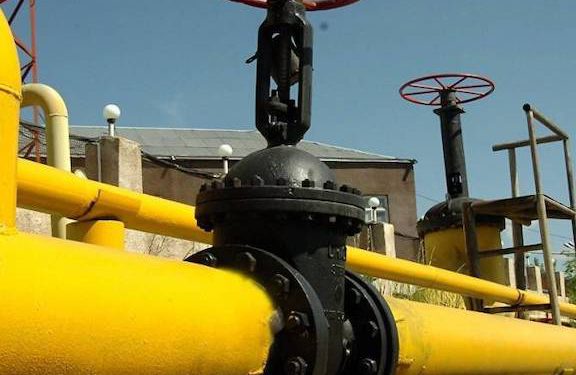A pipeline carrying gas from Armenia to Artsakh
As result of the negotiations that proceeded with support from the Armenian government and the Russian peacekeepers, the Azerbaijani side on March 16 began the repair works of the damaged gas pipeline in Artsakh.
The pipeline that transports natural gas from Armenia to Artsakh is located in an area near Shushi that is currently occupied by Azerbaijan. The pipeline was damaged on March 7 and the Azerbaijani forces were impeding repair efforts, thus leaving the entire population of Artsakh without gas for more than a week.
The Artsakh Information Center, which reported on the start of the repair work, said that the gas supply will be restored as soon as possible.
“The Government of Artsakh apologized to all citizens for the difficulties and is assuring that all problems facing Artsakh can be resolved through unity, decisiveness and patience,” the Artsakh authorities said.
The residents were urged to be vigilant to ensure that there is no gas leakage or other emergencies during the resumption of gas supply.
The disruption of gas supply by Azerbaijan has created many problems for schools, kindergartens, and other educational institutions in Artsakh, both in terms of heating and food, Artsakh’s Human Rights Defender Gegham Stepanyan said in a social media post on Wednesday.
He explained that 70 percent of hospitals in Artsakh rely and are heated by natural gas.
Stepanyan explained that 400 patients have been impacted by the gas shortage, 46 of whom are children of varying ages and 50 are mothers of newborns and their children.
“Azerbaijan continues to deprive the people of Artsakh of gas supply in the absence of international reaction,” Stepanyan said.
European Parliament member from Estonia, Marina Kaljurand, who chairs the delegation on the South Caucasus, warned and voiced concern about a humanitarian crisis in Artsakh.
“I am increasingly worried about the plight of the people of Nagorno-Karabakh, at the brink of a humanitarian crisis, just as the world’s attention is focused on the aggression of the Russian Federation against Ukraine,” Kaljurand said in a statement that cited the stoppage of gas deliveries to Artsakh, as well as the continued breach of the ceasefire by Azerbaijani forces, who have been shelling villages in Artsakh’s Askeran region for weeks.
“I am seriously concerned by these developments and the humanitarian situation in Nagorno-Karabakh and strongly condemn any hostile actions aimed at civilians. I reiterate my call for the speedy resumption of negotiations on a lasting conflict settlement and recall the EU’s readiness to step up assistance to build confidence and address humanitarian and other issues,” Kaljurand said in her statement.
A group of civic organizations that advocate for persons with disabilities, known as the Coalition for Inclusive Legal Reforms, has issued a statement drawing attention to the humanitarian crisis created by the gas stoppage.
“The disruption of the gas supply has led to massive human rights violations of more than a hundred thousand people, having a disproportionate impact on persons with disabilities and their families. The lack of gas supply, exacerbating the humanitarian difficulties of the post-war situation and the pandemic, hinders the realization of the rights to education, health and independent living of the persons with disabilities living in Artsakh,” said the statement.
“Organizations providing rehabilitation and care services are forced to act with restrictions, failing to provide a completely safe environment for citizens with health conditions. Incomplete operation of pre-school and secondary education institutions may impair the exercise of children’s right to inclusive education, leading to the exclusion of children with disabilities from education,” the statement added, pointing out the rising gas prices, as well as the absence of other sources of supply for Artsakh.
“We demand from the Republic of Azerbaijan to listen to the collective voice of the people of Artsakh, to take all necessary actions for the urgent restoration of gas supply, intimidation of the civilian population and abandonment of the policy based on Armenophobia, and for peaceful coexistence. We reiterate our call for the observance of the principles of international law, including the rules of war for the protection of the civilian population, for the immediate and unconditional cessation of all hostilities and the demonstrative deployment of heavy military equipment,” the group said.
“We urge the Republic of Armenia to continue the implementation of emergency humanitarian assistance programs in Artsakh (Nagorno-Karabakh), prioritizing the support of persons with disabilities and their families, the right to independent living and the security of persons living in institutions. We urge the government to work with organizations for persons with disabilities in Armenia and Artsakh to make all humanitarian assistance programs more inclusive, effective, and accessible,” the coalition added.
“We expect the international organizations and diplomatic missions to clearly condemn the massive human rights violations by the Azerbaijani authorities, in case of deliberate obstruction of the obstacles, if possible, to impose economic, other obstacles and restrictions, to study, respond to the needs of children and adults with disabilities. We consider the strengthening of organizations created and led by persons with disabilities (OPDs) in Artsakh (Nagorno-Karabakh) as a priority to protect human rights,” said the group.
“We urge humanitarian organizations and individuals to increase their assistance to persons with disabilities while promoting employment for them and their families. It is urgent to provide the Artsakh care nursing home, psychiatric center, and organizations providing child care services with electric heating devices. At the same time, we urge you not to make investments that could indefinitely prolong the isolation of persons with disabilities in the institutions, but to support their right to live in the community and the development of community-based services,” the statement said.

